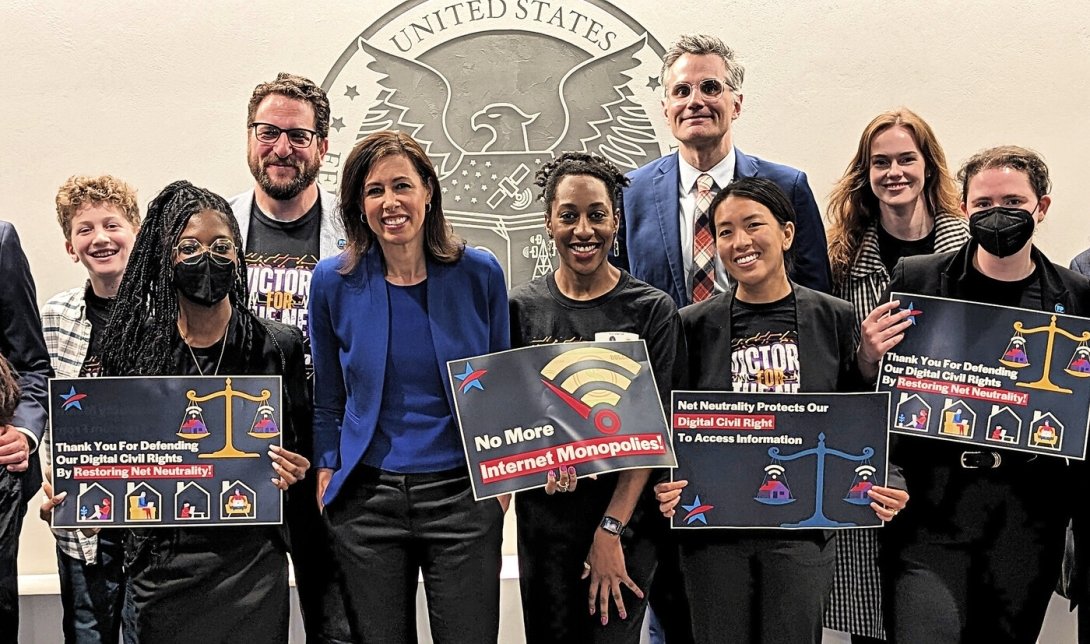A Mistaken Court Ruling Is the Latest Hurdle in the Net Neutrality Fight

Free Press staffers and allies celebrated when the Biden FCC voted to restore Net Neutrality and Title II. Almost immediately industry players sued to overturn the protections.
Over the last decade, a familiar pattern has emerged: As soon as the Federal Communications Commission adopts Net Neutrality rules, industry players like AT&T, Comcast and Verizon sue to overturn them.
In the most recent iteration of this battle, the Biden FCC adopted strong Net Neutrality protections in April and restored its Title II authority to hold broadband providers accountable — and almost immediately industry groups sued to repeal the rules. In a setback for internet users, on Aug. 1, 2024, the U.S. Court of Appeals for the 6th Circuit granted the ISPs’ request to stay implementation of these rules until the court conducts its full review of the case in the fall.
So what will happen next?
First, let’s take a look at how we got here.
The Net Neutrality fight: a brief history
In 2015, a movement that united grassroots activists, racial-justice leaders, technologists, students, artists and millions of internet users pushed the Obama FCC to approve the strongest Net Neutrality protections the agency had ever adopted. Rooted in Title II of the Communications Act, the rules were founded on solid authority that Congress gave the FCC and empowered the agency to take action if broadband providers exploited or otherwise harmed internet users.
Industry sued to overturn these protections, but courts twice ruled in favor of the FCC. Then along came the Trump FCC — with former Verizon lawyer Ajit Pai at the helm. In 2017, the agency ignored the overwhelming public outcry, jettisoned the Net Neutrality rules and ditched its Title II authority. Without Title II, the Trump FCC had to beg broadband providers during the peak of the COVID-19 pandemic to agree to toothless pledges to keep internet users connected — pledges many of these companies failed to uphold.
People from across the political spectrum urged the Biden FCC to restore Net Neutrality and Title II. Soon after the confirmation of Commissioner Anna Gomez broke a deadlock at the agency, the FCC got to work on bringing back these common-sense protections.
Open-internet advocates celebrated when the FCC under Chairwoman Jessica Rosenworcel reinstated Net Neutrality and Title II on April 25, 2024. “This is what democracy should look like: public servants responding to public sentiment, taking steps to protect just and reasonable services and free expression, and showing that the government is capable of defending the public interest,” said Free Press Co-CEO Craig Aaron.
Title II makes powerful telecommunications companies accountable for providing service on just, reasonable and nondiscriminatory terms to internet users across the United States. Title II also does more than provide a foundation for Net Neutrality rules. It enables the FCC to protect internet users from ISPs’ privacy invasions, promote broadband competition and deployment, and take action against hidden junk fees, data caps and billing rip-offs.
If AT&T and its cronies hadn’t sued, the rules would have taken effect on July 22. And by granting industry’s request for a stay, the 6th Circuit put the rules on hold for now.
The court decision is a setback, but a temporary one
There’s no sugarcoating it: The court’s ruling is a disappointment. It harms internet users who need the nation’s communications regulator — i.e., the FCC — to be able to oversee the nation’s communications infrastructure.
“While we hit a procedural hurdle,” said Free Press VP and General Counsel Matt Wood, “Free Press is determined to see the FCC’s decision go into effect. We were disappointed to see the reviewing panel’s cursory analysis, especially its willingness to accept ISPs’ unfounded claims of irreparable harm. After it requested two rounds of supplemental briefing, we expected the court to engage more with the issues at stake in this case.
“A different panel will still need to evaluate the ISPs’ and FCC’s arguments in full when the 6th Circuit reviews the case on the merits. We’re confident that we will ultimately prevail in this case, even in the wake of this disappointing outcome and even in light of recent Supreme Court decisions aimed at weakening federal agencies’ oversight. That’s because this FCC decision followed the law and classified broadband as the essential telecommunications service Congress intended such offerings to be.”
In granting the stay, the court set an accelerated timetable for the case that will see the parties’ briefs filed in August and September. The court will hear oral arguments in late October.
The industry’s case relies, as it always has, on false claims that Net Neutrality and Title II hamper investment.
“Industry lobbyists and other Net Neutrality opponents have argued, loudly but cynically, that the Trump-era repeal somehow spurred broadband deployment and speed increases, claiming that the rules’ presence impairs those upgrades,” said Wood. “This is nonsense, as Free Press has shown time and time again by examining the companies’ own financial statements and investor briefings. [The court’s decision] unfortunately accepts the false premise that the FCC’s rules prevent broadband providers from rolling out new products. ISPs make such claims only in court; they never make them to their investors.”
Free Press moved to join the case as intervenors in June and is waiting on the court’s response. If the court grants that motion, Free Press’ legal team and allies will file a brief to support the FCC’s case.
We’ve been down this road before and will keep fighting for internet users — and for the FCC’s right to hold companies like AT&T, Comcast and Verizon accountable.
We need your help to ensure we have the resources we need to win: Donate today.